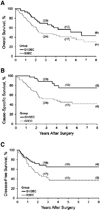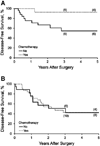Efficacy of contemporary chemotherapy in stage IIIC endometrial cancer: a histologic dichotomy
- PMID: 24434057
- PMCID: PMC4310003
- DOI: 10.1016/j.ygyno.2014.01.007
Efficacy of contemporary chemotherapy in stage IIIC endometrial cancer: a histologic dichotomy
Abstract
Background: Treatment failures in stage IIIC endometrial carcinoma (EC) are predominantly due to occult extrapelvic metastases (EPM). The impact of chemotherapy on occult EPM was investigated according to grade (G), G1/2EC vs G3EC.
Methods: All surgical-stage IIIC EC cases from January 1, 1999, through December 31, 2008, from Mayo Clinic were included. Patient-, disease-, and treatment-specific risk factors were assessed for association with overall survival, cause-specific survival, and extrapelvic disease-free survival (DFS) using Cox proportional hazards regression.
Results: 109 cases met criteria, with 92 (84%) having systematic lymphadenectomy (>10 pelvic and >5 paraaortic lymph nodes resected). In patients with documented recurrence sites, occult EPM accounted for 88%. Among G1/2EC cases (n=48), the sole independent predictor of extrapelvic DFS was grade 2 histology (hazard ratio [HR], 0.28; 95% CI, 0.08-0.91; P=.03) while receipt of adjuvant chemotherapy approached significance (HR 0.13; 95% CI, 0.02, 1.01; P=.0511). The 5-year extrapelvic DFS with and without adjuvant chemotherapy was 93% and 54%, respectively (log-rank, P=.02). Among G3EC (n=61), the sole independent predictor of extrapelvic DFS was lymphovascular space involvement (HR, 2.63; 95% CI, 1.16-5.97; P=.02). Adjuvant chemotherapy did not affect occult EPM in G3EC; the 5-year extrapelvic DFS for G3EC with and without adjuvant chemotherapy was 43% and 42%, respectively (log-rank, P=.91).
Conclusions: Chemotherapy improves extrapelvic DFS for stage IIIC G1/2EC but not stage IIIC G3EC. Future efforts should focus on prospectively assessing the impact of chemotherapy on DFS in G3EC and developing innovative phase I and II trials of novel systemic therapies for advanced G3EC.
Keywords: Chemotherapy efficacy; Occult extrapelvic metastases; Stage IIIC endometrial cancer; Survival.
Copyright © 2014 Elsevier Inc. All rights reserved.
Conflict of interest statement
The authors declare that there are no conflicts of interest.
Figures


Similar articles
-
Lymph-vascular space invasion and number of positive para-aortic node groups predict survival in node-positive patients with endometrial cancer.Gynecol Oncol. 2005 Mar;96(3):651-7. doi: 10.1016/j.ygyno.2004.11.026. Gynecol Oncol. 2005. PMID: 15721407
-
Clinicopathological characteristics, treatment and outcomes in uterine carcinosarcoma and grade 3 endometrial cancer patients: a comparative study.J Gynecol Oncol. 2016 Mar;27(2):e18. doi: 10.3802/jgo.2016.27.e18. Epub 2015 Oct 12. J Gynecol Oncol. 2016. PMID: 26463439 Free PMC article.
-
Adjuvant therapy for early stage, endometrial cancer with lymphovascular space invasion: Is there a role for chemotherapy?Gynecol Oncol. 2020 Mar;156(3):568-574. doi: 10.1016/j.ygyno.2019.12.028. Epub 2020 Jan 14. Gynecol Oncol. 2020. PMID: 31948730 Free PMC article.
-
Characteristics of patients with late recurrence endometrial cancer.J Cancer Res Ther. 2024 Jan 1;20(1):232-237. doi: 10.4103/jcrt.jcrt_888_22. Epub 2023 Apr 8. J Cancer Res Ther. 2024. PMID: 38554326 Review.
-
Chemotherapy for Endometrial Cancer in Adjuvant and Advanced Disease Settings.Oncologist. 2016 Oct;21(10):1250-1259. doi: 10.1634/theoncologist.2016-0062. Epub 2016 Jul 13. Oncologist. 2016. PMID: 27412393 Free PMC article. Review.
Cited by
-
ECPPF (E2F1, CCNA2, POLE, PPP2R1A, FBXW7) stratification: Profiling high-risk subtypes of histomorphologically low-risk and treatment-insensitive endometrioid endometrial cancer.PLoS One. 2022 Dec 1;17(12):e0278408. doi: 10.1371/journal.pone.0278408. eCollection 2022. PLoS One. 2022. PMID: 36454788 Free PMC article.
-
HMGB1 is negatively correlated with the development of endometrial carcinoma and prevents cancer cell invasion and metastasis by inhibiting the process of epithelial-to-mesenchymal transition.Onco Targets Ther. 2017 Mar 3;10:1389-1402. doi: 10.2147/OTT.S123085. eCollection 2017. Onco Targets Ther. 2017. PMID: 28424555 Free PMC article.
-
Fibulin-4 is associated with prognosis of endometrial cancer patients and inhibits cancer cell invasion and metastasis via Wnt/β-catenin signaling pathway.Oncotarget. 2017 Mar 21;8(12):18991-19012. doi: 10.18632/oncotarget.15086. Oncotarget. 2017. PMID: 28177909 Free PMC article.
-
Adjuvant sequential chemo and radiotherapy improves the oncological outcome in high risk endometrial cancer.J Gynecol Oncol. 2015 Oct;26(4):284-92. doi: 10.3802/jgo.2015.26.4.284. Epub 2015 Jul 14. J Gynecol Oncol. 2015. PMID: 26197768 Free PMC article. Clinical Trial.
-
ESGO/ESTRO/ESP Guidelines for the management of patients with endometrial carcinoma.Virchows Arch. 2021 Feb;478(2):153-190. doi: 10.1007/s00428-020-03007-z. Virchows Arch. 2021. PMID: 33604759
References
-
- Kilgore LC, Partridge EE, Alvarez RD, Austin JM, Shingleton HM, Noojin F, 3rd, et al. Adenocarcinoma of the endometrium: survival comparisons of patients with and without pelvic node sampling. Gynecol Oncol. 1995 Jan;56(1):29–33. - PubMed
-
- Mariani A, Webb MJ, Galli L, Podratz KC. Potential therapeutic role of para-aortic lymphadenectomy in node-positive endometrial cancer. Gynecol Oncol. 2000 Mar;76(3):348–356. - PubMed
-
- Havrilesky LJ, Cragun JM, Calingaert B, Synan I, Secord AA, Soper JT, et al. Resection of lymph node metastases influences survival in stage IIIC endometrial cancer. Gynecol Oncol. 2005 Dec;99(3):689–695. [Epub 2005 Aug 29]. - PubMed
-
- Mariani A, Dowdy SC, Cliby WA, Haddock MG, Keeney GL, Lesnick TG, et al. Efficacy of systematic lymphadenectomy and adjuvant radiotherapy in node-positive endometrial cancer patients. Gynecol Oncol. 2008 May;101(2) [Epub 2006 Feb 28]. - PubMed
MeSH terms
Grants and funding
LinkOut - more resources
Full Text Sources
Other Literature Sources
Miscellaneous

